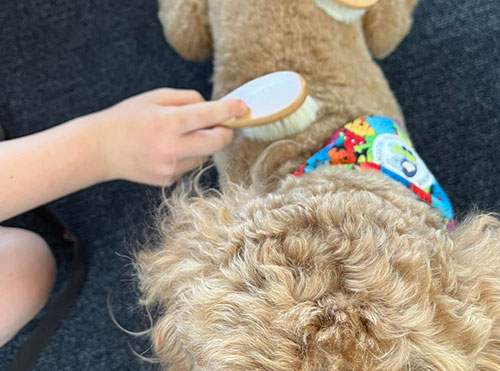
Our Blog
Supporting Children with Sensory Issues: The Role of Therapy Dog Handlers Children with sensory issues face unique challenges in

Sensory issues can impact a child's ability to regulate their responses to sensory stimuli, leading to difficulties in social interactions, learning, and overall well-being. In this blog, we will explore how therapy dog handlers can play a vital role in supporting children with sensory issues.
Understanding Sensory Issues.
Sensory processing disorder (SPD) is a complex condition that affects how the brain processes sensory information. Children with SPD may experience hypersensitivity, hyposensitivity, sensory seeking, sensory avoiding, or poor sensory discrimination. These issues can manifest in various ways, such as sensitivity to noise, lights, textures, or difficulties with balance and coordination.
Creating a Calming Environment
Our Canine Comprehension Mentor and Therapy dog teams can help create a calming environment for children with sensory issues by ensuring that the surroundings are quiet, organised, and free from excessive stimuli. By maintaining a soothing atmosphere, handlers can help children feel more comfortable and relaxed, facilitating better engagement and interaction with the therapy dog.
Providing Emotional Support
One of the most significant benefits of our work is their ability to provide emotional support and comfort. Mentors can encourage children to interact with the dog through petting, cuddling, or simply being in their presence. They can even work with the individual to make sure they are included in ways that allow them to feel safe and comfortable, such as using a brush with the dog instead of their hand (as in the photo.) This interaction can help reduce anxiety, alleviate stress, and promote feelings of security and well-being.
Sensory Stimulation
Interacting with our therapy dogs can provide valuable sensory stimulation for children with sensory issues. Handlers can incorporate activities such as brushing the dog's fur, playing with toys, or going for walks, which engage the child's senses in a gentle and enjoyable manner. These sensory-rich experiences can help regulate sensory input and promote relaxation and self-regulation.
Facilitating Social Interaction
Our Therapy dogs can serve as social catalysts, encouraging positive interactions between children with sensory issues and their peers. Mentors can facilitate group activities or cooperative tasks involving the therapy dog, which provide opportunities for socialisation, communication, and collaboration. These interactions can help build social skills, foster friendships, and enhance the child's sense of belonging and inclusion.
Teaching Coping Skills
Canine Comprehension Mentors often teach children coping skills and strategies for managing sensory overload or anxiety in the presence of the therapy dog. This may include deep breathing exercises, mindfulness techniques, or simple relaxation exercises. By practicing these coping skills during interactions with the therapy dog, children can learn to regulate their emotions and responses to sensory stimuli more effectively.
Increasing Confidence and Self-Esteem
Mentors can provide opportunities for the child to engage in activities with the dog, such as practicing obedience commands or participating in agility exercises. These activities promote a sense of accomplishment and competence, helping children develop a positive self-image and belief in their abilities.
It’s an absolute joy to watch our therapy dog teams play a crucial role in supporting children with sensory issues by providing emotional support, sensory stimulation, social interaction, coping skills, and opportunities for personal growth and development. Through their partnership with therapy dogs, Mentors create a nurturing and inclusive environment where children can thrive and overcome the challenges associated with sensory processing difficulties.
